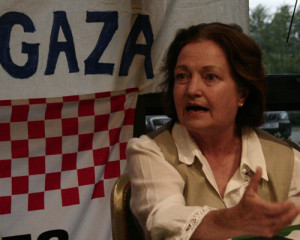The PHM solidarity mission in Gaza met on March 1st with the Palestinian Non Governmental Organisation Network (PNGO), an umbrella organisation that includes more than 130 NGOs in the West Bank and Gaza. Objective of the meeting was to listen to the voices of the health and human rights NGOs and activists on the situation six month after the ceasefire, and to share the solidarity of the global movement with the people in Gaza.
Dr. Mona El Farra, vice-president of the Palestinian Red Crescent Society, recalled that “the 51-day attack came after many others and put a burden on the Palestinian society for the days to come.” She said the people in Gaza suffer from two type of war crimes: “one related to the assault, and the other to the fact that the world accepts that 1.8 million people live under occupation and siege.”
“In medical terms, we can say that we suffer from a humanitarian syndrome but the underlying disease is political”, added Dr. Aed Yaghi, director of the Palestinian Medical Relief Society in Gaza and PHM activist, “and that is the Israeli occupation. The solution can not be only humanitarian, we have to treat the disease.”
Amjad al-Shawa, PNGO director in the Gaza Strip, added that in 2008, after Israel declared Gaza a “hostile entity”, donors started to deal with Gaza as a humanitarian case. “Billions of dollars have been spent, but even before this last war food insecurity reached 57%. Is this the success of the international community? Where is the promised change in our life conditions? The international community is part of the problem and not part of the solution. We need justice, rights, voice, because all that we have here is a cumulation of failures.”
Dr. El Farra is also skeptical on the role of international aid: “People speak about health development, but I ask myself what that means in a country under occupation. We are not self-sufficient and have to depend on aid that is unreliable and unstable. There can be no such thing as health development under occupation.”
PNGO rejects all forms of conditional aid and is now advocating against the Gaza Reconstruction Mechanism (GRM), that regulates the entry and distribution of building materials, mainly cement, to the people whose houses were demolished. PNGO believes that this is a legitimation of the siege and demands that the UN and the Palestinian Authority withdraw from it: “We can not accept the Israeli declaration that a humanitarian corridor has been opened, we must demand full opening and that Israel be held accountable for the population under the state of occupation.”
Words of hope are directed towards the PHM and in general towards all solidarity movements that are spread around the world. “We’ll continue to raise our voice and never give up”, says Dr. El Farra, “You have to know that you are not weak and that one day justice will prevail.” Justice and solidarity, rather than charity, is the demand that comes from the people in Gaza. “Despite all, we are not victims but freedom fighters. We fight for freedom, justice, to play a role in our society and our land.”
The members of the PHM solidarity mission expressed their appreciation for the strength and courage of the local health community and stressed that the Palestinian people have the support of grassroots movements and health activists the world over: “We are just two and only from Europe, because of practical reasons, but we are representing movements in other parts of the world, including Asia, Latin America and Africa. They stand with the Palestinians in solidarity and share your vision of freedom and justice.”
Chiara Bodini (Italy) and Wim De Ceukelaire (Belgium) are on a PHM solidarity mission in Gaza.

Leave a Reply